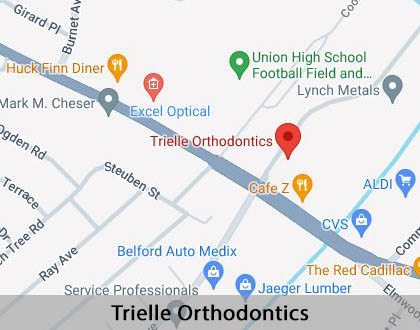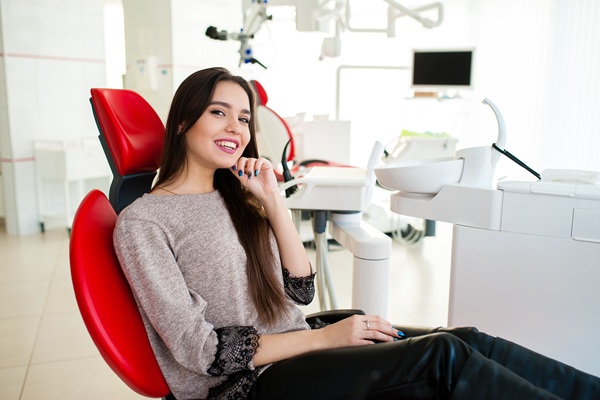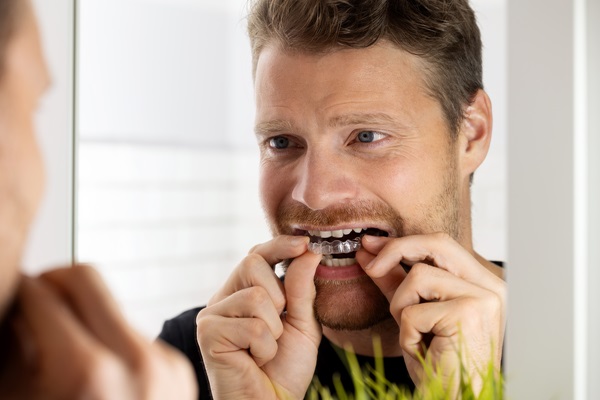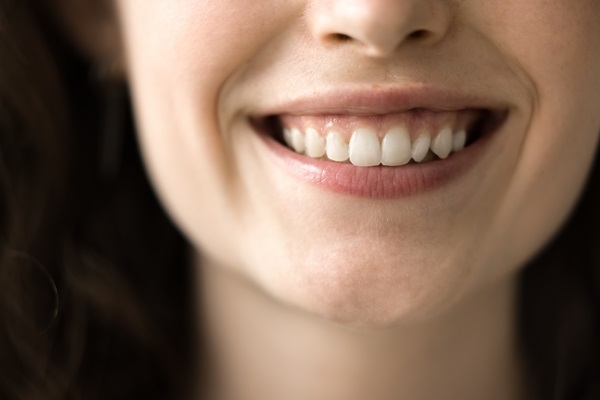Braces for Teens Union, NJ
Braces can help your teen get a straighter and healthier smile. Crooked teeth are not just a matter of aesthetics. Braces can also benefit your child’s overall and oral health.
Braces for teens are available at Trielle Orthodontics in Union and the surrounding area. Make sure your child is on the right track for good oral health. Call us today at (908) 344-3388 to schedule an appointment or learn more about our services.
Why Braces for Teens
According to the American Association of Orthodontists, one’s oral health is reflective of their overall health. In other words, crooked teeth are not just a cosmetic issue. Instead, braces are often necessary to help facilitate biting, chewing, and speaking. Misaligned teeth can be harder to clean and wear away at tooth enamel, which can lead to costly procedures in the long run.
Braces can offer corrective treatment for several different issues. These include overcrowded or crooked teeth, gaps between the teeth, overbites, overjets, underbites, and other jaw misalignment problems. Teenagers are at a perfect age to get braces because their heads and mouths are still growing, making their teeth more conducive to straightening.
“Misaligned teeth can be harder to clean and wear away at the tooth enamel, which can lead to costly procedures in the long run.”
Convincing Your Child to Get Braces
It can be difficult to convince an image-conscious teen to wear braces. However, parents and caregivers can talk to their teens about the health benefits of a straighter smile. Do not focus on the cosmetic effects, as this may make teens feel more self-conscious and hesitant. Instead, talk about how braces can undo the side effects of malocclusion. This includes undoing side effects such as discomfort when chewing or biting, speech impediments, temporomandibular joint disorders (TMJ/TMD), and more.
Parents and caregivers with children who play sports may be worried about potential oral trauma when their children are out in the field. Fortunately, mouthguards can help. Mouthguards are dental devices worn over the teeth during sports to help ward off oral injury. These are especially important for anyone who plays contact sports, as they protect against cut lips, broken teeth, and other forms of damage to the mouth.
“…parents and caregivers can talk to their teens about the health benefits of a straighter smile.”
Oral Hygiene with Braces for Teens
Of course, braces require making some lifestyle adjustments. This includes adapting one’s oral hygiene routine as necessary. Since it generally becomes harder to maintain an oral hygiene routine after braces, teens should make sure to limit their intake of sugary and starchy foods and beverages, as these can contribute to plaque formation and tooth decay.
They should also brush carefully after every meal with a fluoridated toothpaste and a soft-bristled toothbrush. Additionally, teens should rinse thoroughly to flush out all particles from their braces. A fluoride rinse is recommended, and teens should floss between braces and under wires. They should also avoid sticky, hard, or crunchy foods whenever possible.
“Since it generally becomes harder to maintain an oral hygiene routine after braces, teens should make sure to limit their intake of sugary and starchy foods and beverages, as these can contribute to plaque formation and tooth decay.”
Check out what others are saying about our orthodontic services on Yelp: Braces for Teens in Union, NJ
Types of Braces for Teens
In this day and age, there are more types of braces for teens than ever before. These include:
- Ceramic braces
- Clear aligners
- Lingual braces
- Traditional metal braces
Traditional metal braces, ceramic braces, and lingual braces are all made of brackets and wires that gradually guide the teeth into position. However, lingual braces are fixed to the tongue’s side of the teeth, and ceramic braces have tooth-colored ceramic brackets for a more inconspicuous appearance. Traditional metal braces are often the only option for severe orthodontic issues, while ceramic and lingual braces are more suited for mild to moderate cases.
Clear aligners are removable trays custom-designed to fit tightly over the patient’s teeth. The patient must switch out to a new set of aligners every few weeks to realign their teeth into their correct position. Additionally, patients must wear them for 20 to 22 hours per day to see results. These are best for patients with mild to moderate teeth misalignment who have the commitment to keep them on all throughout the day.
“In this day and age, there are more types of braces for teens than ever before.”
Questions Answered on This Page
Q. Can braces really impact my teen’s oral health?
Q. How should I talk to my teen about getting braces?
Q. How should teens with braces take care of their oral hygiene?
Q. What type of braces are right for my teen?
Q. What should I ask during the first consultation?
People Also Ask
Q. What are the different teeth straightening options?
Q. Is it safe to play sports while wearing braces?
Q. What are the benefits for teenagers wearing Invisalign Teen?
What to Ask About Braces for Teens
Generally, the first question on every teen’s mind is, “How long will my treatment take?” Parents and caregivers also concern themselves with questions like “How often will adjustments be? What happens if treatment runs over the estimated time?”
These answers vary on a case-by-case basis. However, according to Healthline, most people complete treatment within one to three years. A general rule of thumb is that the more complicated cases require longer treatment times. Our team will be happy to answer all these questions and more in a one-on-one consultation.
“A general rule of thumb is that the more complicated cases require longer treatment times.”
Frequently Asked Questions About Braces For Teens
Q. Do braces hurt?
A. Most patients do not feel any pain during the treatment process. However, it is not uncommon to feel some discomfort, especially when first getting the braces placed or when getting them adjusted. If your teen starts experiencing considerable pain, call us immediately.
Q. Will my teen need to wear a retainer after completing treatment?
A. Yes, retainers are almost always necessary after treatment. Teeth generally want to return to their original position and need to be guided back into place. Otherwise, all the effort put into orthodontic treatment may be lost.
Q. What if my teen breaks or loses their clear aligners?
A. Call us immediately so we can get started on creating a replacement set right away. In the meantime, we may advise your teen to either wear their previous set of aligners or move onto the next step, depending on what stage of treatment they are in.
Q. How often will my teen need to come in for check-ups when wearing braces?
A. Trielle Orthodontics checks up on each patient every four to eight weeks on average. However, this number varies on a case-by-case basis. Each appointment typically lasts about 20 to 40 minutes.
Q. Will my teen still need to go to the dentist if they have braces?
A. Yes. In fact, since it is more difficult to maintain oral hygiene, regular dental visits are even more important while your teen is wearing braces. Our team will work closely with your dentist to ensure your teen’s oral health is in optimal condition.
Quality Orthodontic Services Can Transform Smiles
By visiting us as soon as possible, our team can help get you the professional treatment you need.
Definition of Orthodontic Terminology
Call Us Today
Braces can set your teen up for good oral and overall health for the rest of their lives. We at Trielle Orthodontics can help. Call us today at 908-344-3388 to schedule an appointment or learn more about our services.
Helpful Related Links
- American Dental Association (ADA). Glossary of Dental Terms. 2021
About our business and website security
- Trielle Orthodontics was established in 2023.
- We accept the following payment methods: American Express, Cash, Check, Discover, MasterCard, and Visa
- We serve patients from the following counties: Union County
- We serve patients from the following cities: Union, Linden, Elizabeth, Westfield, Summit, and Cranford
- Norton Safe Web. View Details
- Trend Micro Site Safety Center. View Details
Back to top of Braces for Teens







